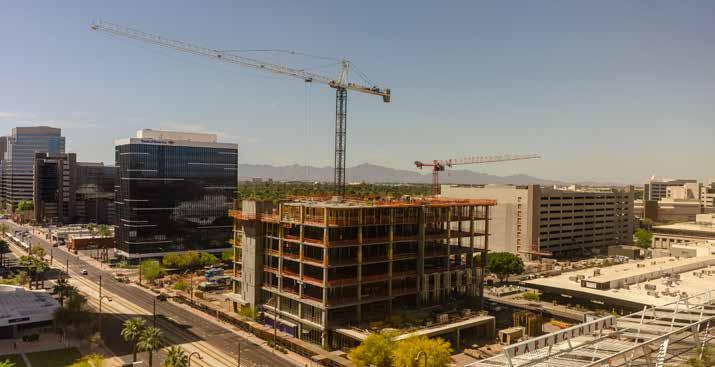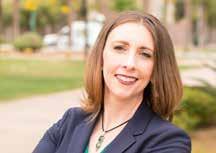
10 minute read
Legislative Update
from AZRE May/June 2020
by AZ Big Media
Legislature working to counter economic effects of pandemic
The Arizona Legislature in March passed a “skinny budget” to provide certainty for state government agencies, public schools, local governments, and government contractors dependent on state funding. The bills passed by the Arizona Legislature are similar to continuing resolutions that provide funding at current levels into the next fiscal year.
Arizona Association for Economic Development (AAED) has been paying specific attention to this year’s legislation especially since the pandemic, COVID-19 has everyone’s attention and is an economic disruption. For economic development purposes, this means that the Arizona Commerce Authority and Arizona Office of Tourism will receive the same appropriations each office received last year.
The Legislature also passed an additional $50 million in COVID-19 relief. The money will flow through the Governor’s Office and is to be used for economic assistance during the state of emergency including: • Housing assistance, including payments to prevent foreclosure or eviction. • Monies for entities to provide services for homeless people, including shelter, clothing, food and transportation. • Economic assistance to small businesses with less than 50 employees, health care providers and nonprofit organizations.
Nicole Snyder
AAED

• Monies for food bank operations.
In addition to passing a budget, the Arizona Legislature sent a key economic development bill to the Governor before it recessed. HB 2771 extends the income tax credits for qualifying investments in qualified facilities and qualified research activity. It was signed by Governor Ducey on March 13th. The bill includes the following provisions: 1. Specifies that capital investments made in a qualified facility up to 36 months before submitting an application for preapproval are included in the computation of a tax credit. 2. Allows the ACA to preapprove applicants as qualifying for income tax credits for investments made in qualified facilities for any taxable year until January 1, 2031. 3. Extends the corporate and individual income tax credit for qualifying investment and employment in expanding or locating a qualified facility until January 1, 2031.
4. States that an international operations center that is certified after December 31, 2018 may not claim a corporate tax credit for renewable energy investment. 5. Specifies that a minimum investment in renewable energy facilities must be completed within a three-year period beginning on the date the initial application is received or by January 1, 2031. 6. Extends the corporate income tax credit for qualified research activity until January 1, 2031. 7. Specifies that a corporate individual tax credit for qualified research activity that is claimed for taxable years beginning before January 1, 2022 may be carried forward for 15 years. 8. Specifies that a corporate individual income tax credit for qualified research activity that is claimed for taxable years beginning on January 1, 2022 may be carried forward for 10 years. 9. Provides that a credit carry forward for qualified research activity from taxable years beginning January 1, 2022 may be carried forward up to 10 years from the year in which the expenses were incurred. 10. Redefines international operations center as a facility or connected facilities under the same ownership that are subject to specific investment thresholds and that selfconsume renewable energy from a qualified facility.
Another economic development bill of interest includes an extension of the existing angel investment tax credit. AAED will continue educating lawmakers about the need for the angel investment credit and other economic development tools.
About AAED: Serving as the leading statewide advocate for responsible economic development in Arizona since 1974, AAED’s foundation has been rooted in three fundamental pillars that continue to affect positive change and increase Arizona’s competitive position to attract investment and create jobs.
Nicole Snyder is president of the AAED and is the healthcare business development & marketing leader for Orcutt | Winslow.
ABA rises up to meet challenge

Commercial construction has been experiencing incredible growth and activity throughout the past few years. The major issue that had been concerning us through these years is the shortage of skilled labor and much of our efforts have been in expanding the skilled workforce labor pool. The COVID-19 virus changed the entire American economy overnight. We went from nearly full employment to millions of workers on unemployment overnight.
At the Arizona Builders Alliance (ABA), we knew that our mission would immediately begin to focus on worker safety and the financial well-being of our industry. The ABA is the Arizona chapter of two national commercial construction trade associations, the Associated General Contractors of America – Building Division (AGC) and the Associated Builders & Contractors (ABC). These national relationships became extremely valuable in the early days of the COVID-19 event. Other ABC and AGC chapters throughout the United States had experienced safety and government regulatory issues that we would soon be experiencing. Those chapters were 7-10 days ahead of Arizona. Because of this, the ABA was ready and able to provide solutions to expected upcoming issues.
ABA demonstrated consistent, positive and calm leadership early on. We informed the entire commercial
Tom Dunn
Arizona Builders Alliance

construction industry that if they needed information, we had it for them. Another benefit of our national trade association ties is that their advocacy and safety staff were on the front lines. Best practices for maintaining construction worksites were collected and distributed. Our web page became an aggregate of information. From safety to government actions and most of all to bring all construction together in a time when many had been distressed, isolated and on their own. We focused on statewide communication and maintaining these strong relationships to protect the worker and the business. Our safety committees, our advisory boards, our board of director meetings, our apprenticeship training, our management training all went virtual. The only programing that had been effected had been social events that are rescheduled.
ABA continued to focus on providing information to the membership. Over the first days of the COVID-19 event, our membership volunteered to get the word out on what the industry needed to know about federal legislation and state regulation to help get our industry through this difficult time.
ABA exerted influence to maintain the financial well-being of commercial construction. The other states had begun discussions on what business is or isn’t essential. We knew that within days, our state leaders would begin to be pressured to make drastic decisions. ABA, along with many business coalitions, worked to inform our state government the importance of commercial construction and that indeed it is essential for the health and welfare of the entire state.
The commercial construction industry’s voice is heard through our strong ABA, AGC and ABC advocacy efforts. Nationally, the AGC and ABC leaders were named to the President’s economic revival task force. In the state of Arizona, ABA is advocating for future action from the Governor to get Arizona’s economy back on track. Our suggestions include supporting all Arizona businesses, as when Arizona thrives, the commercial construction industry thrives.

Navigating the fallout NAIOP working to help members find solutions to economic issues caused by COVID-19 outbreak
NAIOP the Commercial Real Estate Development Association, has been actively working to assist and support our members during the COVID-19 outbreak. This pandemic has brought economic and workforce challenges like no previous crisis. The speed with which the economy was shut down has led to a unique set of difficulties that make lessons from prior financial crises only marginally applicable.
Public Policy Advocacy
First, NAIOP has been advocating on behalf of our members at the city, county, state and federal levels of government. We have been in direct and frequent communication with Governor Ducey’s office as he works to manage the impacts of COVID-19 on public health and the economy. We advocated to have construction included as an essential service and were pleased to see that happen in Executive Order 2020-12 which prohibited cities from ordering the closure of essential businesses. As a result, important construction projects are moving forward using
Suzanne Kinney
NAIOP

best-in-class health and safety protocols to protect workers.
Every day, building owners are working tirelessly in partnership with the tenants that have been directly affected by COVID-19 to make reasonable arrangements for rent payments. These actions have served to avoid evictions and keep existing tenants in place. The Governor’s Executive Order 2020-21 put a stay on small business commercial tenant evictions through the end of May. Each tenant has a unique situation, and building owners are working with them to find customized solutions. In many cases, this includes assisting the tenant in applying for federal Paycheck Protection Program loans or other disaster relief loans that can be used, in part, to cover rent payments.
Owners are also working with their diverse group of lenders to address the forbearance that is needed in some cases as a result of reduced rental income. At the time of this writing, NAIOP is advocating that the Department of Treasury issue guidance on commercial mortgagebacked securities (CMBS) encouraging forbearance and other types of debt relief to help those building owners that have experienced dramatic reductions in rent payments.
On the city level, NAIOP is working to disseminate best practices on virtual building inspections as well as virtual planning and zoning committee hearings and city council meetings. Our goal is to keep projects moving forward to the extent possible despite the inability to meet in person or travel.
On the federal level, NAIOP advocated for deadline extensions
for 1031 exchanges. Section 1031 of the Internal Revenue Code permits taxpayers to defer recognizing capital gain on property under certain specified circumstances and timelines. Unfortunately, due to the COVID-19 outbreak and associated travel restrictions and office closures, businesses in the middle of this process were unable to meet the prescribed timelines. This means they would be required to pay a significant capital gains tax, further reducing liquidity in the real estate market. Fortunately, due to the joint advocacy of NAIOP and a coalition of affected organizations, the IRS recently extended the deadlines to July 15, providing much needed time for these transactions to be completed. We especially appreciate the efforts of our U.S. Senators Kyrsten Sinema and Martha McSally for encouraging the IRS to take this important action. MEMBER RESOURCES
To keep our members informed the Arizona Chapter of NAIOP has launched a weekly video series called Ask NAIOP. These videos feature members with expertise on topics that will help the

industry navigate through the specific challenges brought about by COVID-19. Initial topics include how tenants can use Force Majeure to adjust rent payments, the Governor’s Executive Order on commercial tenant evictions, and what actions building owners should take if someone who works in their building is diagnosed with COVID-19.
NAIOP Corporate is offering webinars twice per week. Topics have included How to Approach Your Mortgage Lender; Liability, Insurance and Rent Abatement; What Will Industrial Development Look Like Post COVID-19, and many more. In addition, NAIOP Corporate is offering all on-demand online courses free of charge to members during the COVID-19 outbreak. Each class is a $795 value.
NAIOP members need not worry about paying their membership dues during the outbreak. Any members who is set to expire during the outbreak, will receive an automatic 3-month membership extension. Any members who have lost their job as a result of COVID-19 will be able to maintain their membership for the rest of the year at no charge. These members will be able to access NAIOP’s job bank and career resources to help them get a new position.
Although it has been necessary to postpone or go virtual on our live events, we are still here for our valued members. We are working to reschedule the events our members love for the fall timeframe and to reinvent those that cannot be rescheduled into a virtual format. Connection matters now more than ever.










